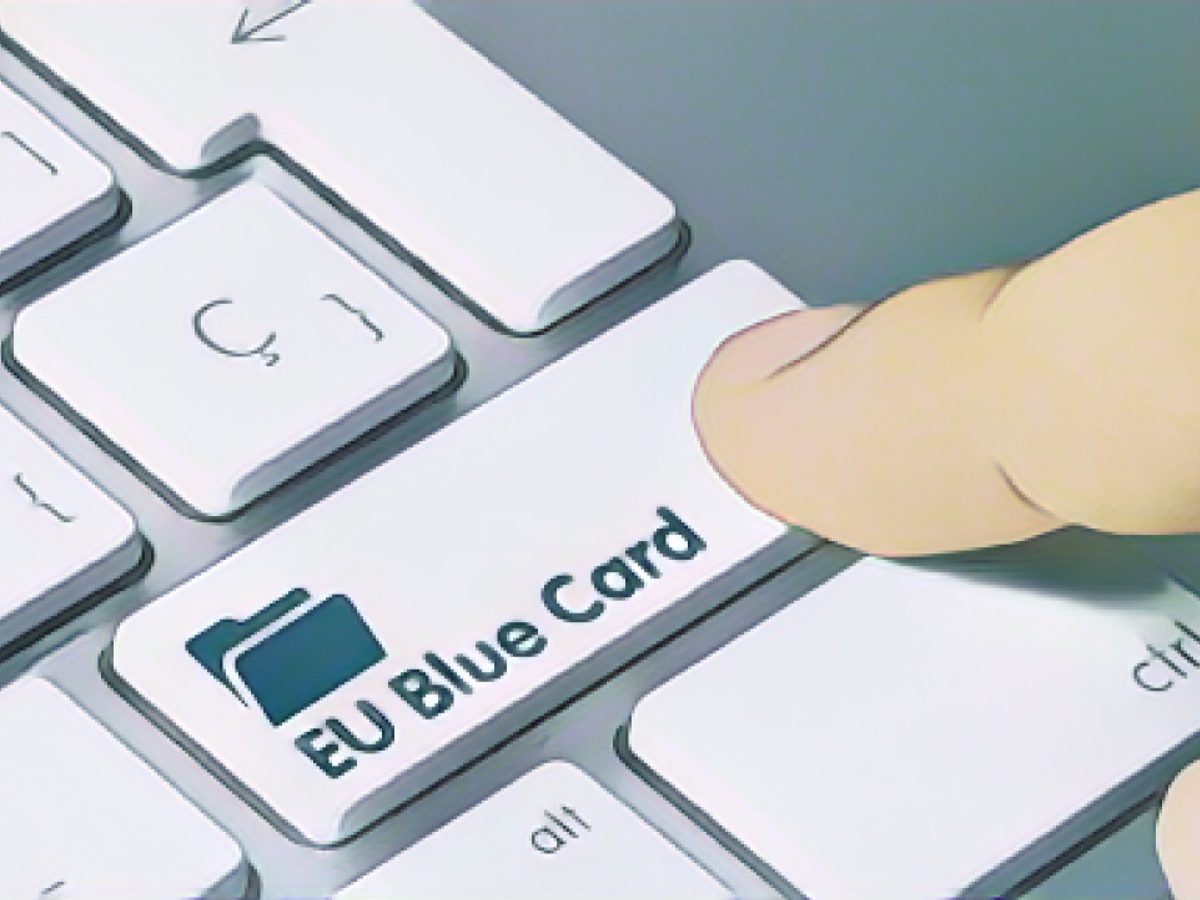EU Blue Card
The EU Blue Card is similar to the American Green Card. It is a special residence permit for people who want to work in Germany as a qualified specialist. If this applies to you and you are not yet living here or in another EU country, you can apply for the EU Blue Card. The requirements are set out in sections 18, 18b, 18c, 18g and 19f of the Residence Act and EU Directive 2009/50/EC.
Please note: An EU Blue Card can be applied for in all EU member states except Denmark and Ireland. However, the requirements, such as the minimum annual salary, vary from country to country.
Important: The amendment to the EU Blue Card Regulation has not yet come into force. It is currently expected to come into force in November 2023. In the following chapter you will find both the current regulations and the upcoming changes.
If you have any further questions, you can also contact our community platform "Together in Germany", our community managers will be happy to answer your questions!
What do I need to know?
Can I get the EU Blue Card in Germany?
As of July 2023 You will receive the EU Blue Card if you:
- have a German university degree, a recognized foreign university degree or a comparable qualification from abroad
- can present a concrete, binding job offer or a job in Germany in the profession you have learned with a minimum annual gross salary of €58,400 (as of 2023)
Important: There is an exception for so-called "shortage occupations", e.g. in the fields of mathematics, engineering, human medicine (except dentistry) and IT professions. Here, a minimum salary of 45,552 euros gross per year is sufficient to obtain an EU Blue Card. However, the Federal Employment Agency must approve the job offer/job. This is to ensure that foreign workers are not employed under worse working conditions than German workers. To shorten the approval procedure, you can apply for approval from the International Placement Services (ZAV) before entering Germany.
Please note: No proof of German language skills is required to obtain an EU Blue Card, unless you wish to work in a regulated profession. You can find out more about regulated professions in our chapter"Recognition of foreign certificates".
In the near future (expected from November 2023)The issuing of the EU Blue Card will be simplified and more professionals will be able to apply for it, including
- People with a German university degree and a binding job offer or an ongoing employment relationship in their field of specialization,
- Persons with a recognized foreign university degree who have a binding job offer or an ongoing employment relationship in their field of study,
- and persons with a comparable university degree, a binding job offer or an ongoing employment relationship in their field of specialization
with a minimum annual gross salary of at least 56.6 percent of the contribution assessment ceiling for general pension insurance.
- Persons who have completed tertiary education (e.g. at universities, universities of applied sciences and vocational academies) that is equivalent to a university degree and has lasted at least three years. This qualification must correspond to a level of the International Standard Classification of Education (ISCED 2011) or at least level 6 of the European Qualifications Framework. If you are not sure whether you meet the requirements, please read the section "Where can I get advice and support?
- Skilled workers in "shortage occupations" can obtain an EU Blue Card with the approval of the Federal Employment Agency if they earn a minimum income of at least 45.3% of the annual contribution assessment ceiling in the general pension insurance scheme.
- University graduates who have obtained their university degree within the last three years can obtain an EU Blue Card with the approval of the Federal Employment Agency if they earn a minimum income of at least 45.3 percent of the annual contribution assessment ceiling for general pension insurance.
- In certain IT professions, the EU Blue Card can also be issued without an academic degree if the Federal Employment Agency agrees. However, the salary must be at least 45.3 percent of the annual contributionassessment ceiling and applicants must be able to demonstrate certain skills, knowledge and abilities through at least three years of professional experience within the last seven years.
Please note: The job offer with which you apply for an EU Blue Card must have a minimum employment duration of six months from the start of the new law.
Good to know: The minimum salaries required to obtain an EU Blue Card are set by the Federal Ministry of the Interior, Building and Community by December 31 of each calendar year. You can find the current figures at www.bamf.de.
Where do I apply for an EU Blue Card?
The foreigners authority is generally responsible for issuing the EU Blue Card.
- If you already have a residence permit in Germany, please contact the relevant immigration authority to obtain an EU Blue Card.
- If you have held an EU Blue Card from another EU member state for at least 18 months, you can enter Germany for the purpose of employment without a work visa. However, you must apply for an EU Blue Card in Germany at the relevant immigration authority within one month of entering the country. You are not allowed to work until you have received approval from the immigration authority.
- If you are a "third-country national" living neither in Germany nor in another EU member state, you must usually first apply for a visa for employment purposes at the German embassy in your place of residence. After entering the country (and before the visa expires), you can apply for an EU Blue Card at the relevant immigration authority.
You can find your local immigration authority at bamf-navi.bamf.de.
Important: Citizens of Japan, Canada, Australia, Great Britain, Northern Ireland, the USA, South Korea, Israel and New Zealand may enter Germany without a visa. However, they must apply for a work permit after entering the country.
Where do I apply for a visa?
If you need a visa to enter Germany, you must first apply for a visa at the German embassy/consulate in your country of origin, your current place of residence (where you have been living for at least 6 months) or a neighboring country and present the documents mentioned there. Further information on the visa application procedure can be found in our chapter "Visa for skilled workers".
Please note: It may take several months to process your visa application.
Remember: Whether you need a visa depends on your country of origin. On Auswaertiges-amt.de you will find a list of countries whose nationals require an entry visa for Germany.
What documents do I need to apply for a visa?
In our chapter"Visa for skilled workers" you will find a list of all the documents that all "third-country nationals" need for a visa for skilled workers. Depending on your country of origin, further documents may be required - it is best to enquire at the German embassy/consulate in your country.
For an EU Blue Card, you will also need the following documents:
- a recognized proof of your university degree
- an employment contract or a binding job offer in Germany (your employer must provide a signed "declaration of employment") with a gross annual salary within the limits specified above.
Please note: You must have degrees obtained abroad recognized in Germany. You can find out how to do this in our chapter "Recognition of foreign degrees".
What happens after entry?
After entering Germany, you must register with the immigration authority at your new place of residence within three months and apply for an EU Blue Card there. To do this, you must again submit the above-mentioned documents and, as a rule, a police registration and a tenancy agreement.
The authorities will check your papers to ensure that you meet the above requirements. You then have a legal entitlement to an EU Blue Card.
The EU Blue Card is usually issued for four years. If your employment contract has a shorter term, the residence permit will be adjusted accordingly. An extension is generally possible.
Can I change my job?
As of July 2023Youcan change your job within the first two years. However, the change must be approved by the immigration authority responsible for you. The requirements for the issue of the Blue Card will then be re-examined.
In the near future (probably from November 2023)In the first twelve months after the EU Blue Card is issued, you do not need permission from the immigration authority to change jobs. However, during this period, the immigration authority may refuse the change of job if the new job does not meet the requirements for the issue of an EU Blue Card.
What are the main advantages of an EU Blue Card?
As of July 2023Familyreunification is easier for holders of an EU Blue Card. For example, with an EU Blue Card, your spouse does not need to present a German language certificate for family reunification. They are also allowed to work immediately after arrival.
In addition, with the EU Blue Card you can obtain a permanent residence permit after just 33 months in Germany if you have a job, pay into the pension scheme and can prove that you have a basic knowledge of German (A1 certificate) - if you can prove that you have a B1 certificate, you can apply for a permanent residence permit after just 21 months.
In the near future (probably from November 2023)The new regulations will allow you more mobility:
- If you hold an EU Blue Card from another EU member state, you can work in Germany for 90 days within a 180-day period. You do not need a residence or work permit for this. However, your work in Germany must be directly related to the employment contract in the other EU country. Important: If your EU Blue Card was issued in a non-Schengen EU member state, additional documents may be required.
- If you have an EU Blue Card that was issued in another EU member state and you have been staying there for at least twelve months with an EU Blue Card, you can come to Germany to take up work. You must also meet the requirements for the issue of an EU Blue Card in Germany.
Where can I find advice and support?
If you have questions about the EU Blue Card, visit our community platform "Together in Germany". Further information on the recognition procedure can be found at www.anerkennung-in-deutschland.de. The"Working and living in Germany" hotline of the Federal Office for Migration and Refugees can also help you and answer your questions by phone and email in German and English.
Important
EU Blue Card holders can obtain a settlement permit after just 33 months. You can find out more about this in our chapter"Settlement permit".
Source: handbookgermany.de




